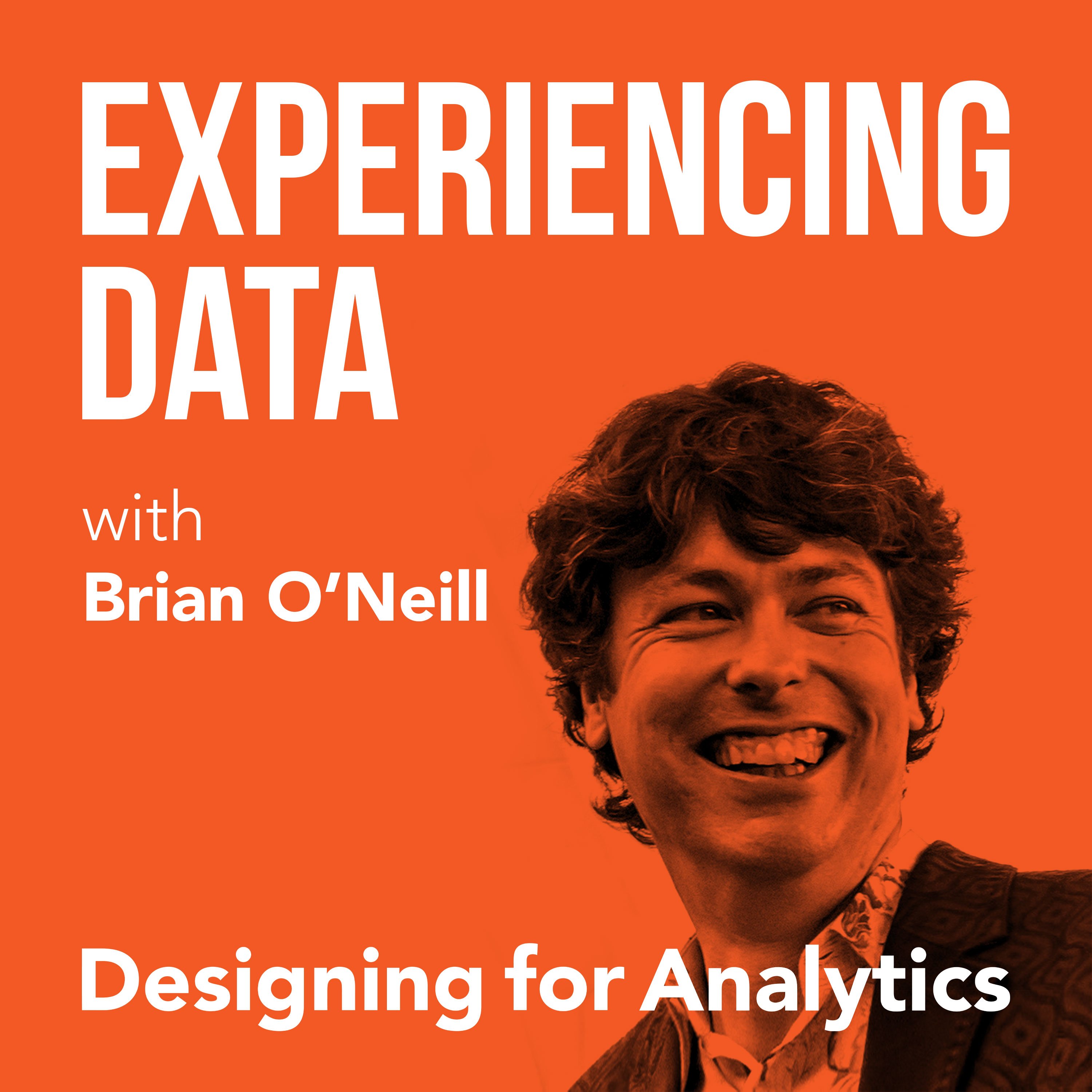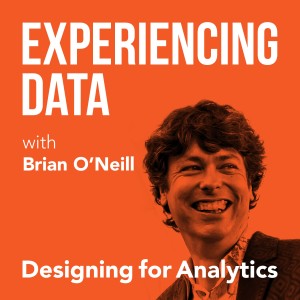

141.5K
Downloads
173
Episodes
Is the value of your enterprise analytics SAAS or AI product not obvious through it’s UI/UX? Got the data and ML models right...but user adoption of your dashboards and UI isn’t what you hoped it would be? While it is easier than ever to create AI and analytics solutions from a technology perspective, do you find as a founder or product leader that getting users to use and buyers to buy seems harder than it should be? If you lead an internal enterprise data team, have you heard that a ”data product” approach can help—but you’re concerned it’s all hype? My name is Brian T. O’Neill, and on Experiencing Data—one of the top 2% of podcasts in the world—I share the stories of leaders who are leveraging product and UX design to make SAAS analytics, AI applications, and internal data products indispensable to their customers. After all, you can’t create business value with data if the humans in the loop can’t or won’t use your solutions. Every 2 weeks, I release interviews with experts and impressive people I’ve met who are doing interesting work at the intersection of enterprise software product management, UX design, AI and analytics—work that you need to hear about and from whom I hope you can borrow strategies. I also occasionally record solo episodes on applying UI/UX design strategies to data products—so you and your team can unlock financial value by making your users’ and customers’ lives better. Hashtag: #ExperiencingData. JOIN MY INSIGHTS LIST FOR 1-PAGE EPISODE SUMMARIES, TRANSCRIPTS, AND FREE UX STRATEGY TIPS https://designingforanalytics.com/ed ABOUT THE HOST, BRIAN T. O’NEILL: https://designingforanalytics.com/bio/
Episodes

Tuesday Jul 13, 2021
Tuesday Jul 13, 2021
Doug Laney is the preeminent expert in the field of infonomics — and it’s not just because he literally wrote the book on it.
As the Data & Analytics Strategy Innovation Fellow at consulting firm West Monroe, Doug helps businesses use infonomics to measure the economic value of their data and monetize it. He also is a visiting professor at the University of Illinois at Urbana-Champaign where he teaches classes on analytics and infonomics.
On this episode of Experiencing Data, Doug and I talk about his book Infonomics, the many different ways that businesses can monetize data, the role of creativity and product management in producing innovative data products, and the ever-evolving role of the Chief Data Officer.
In our chat, we covered:
- Why Doug's book Infonomics argues that measuring data for its value potential is key to effectively managing and monetizing it. (2:21)
- A 'regenerative asset': Innovative methods for deploying and monetizing data — and the differences between direct, indirect, and inverted data monetization. (5:10)
- The responsibilities of a Chief Data Officer (CDO) — and how taking a product management approach to data can generate additional value. (13:28)
- Why Doug believes that a 'lack of vision and leadership' is partly behind organizational hesitancy of data monetization efforts. (17:10)
- ‘A pretty unique skill’: The importance of bringing in people with experience creating and marketing data products when monetizing data. (19:10)
- Insurance and torrenting: Creative ways companies have leveraged their data to generate additional value. (24:27)
- Ethical data monetization: Why Doug believes consumers must receive a benefit when organizations leverage their data for profit. (27:14)
- The data monetization workshops Doug runs for businesses looking to generate new value streams from its data. (29:42)
Quotes from Today’s Episode
“Many organizations [endure] a vicious cycle of not measuring [their data], and therefore not managing, and therefore not monetizing their data as well as they can. The idea behind my book Infonomics is, flip that. I’ll just start with measuring your data, understanding what you have, its quality characteristics, and its value potential. But vision is important as well, and so that’s where we start with monetization, and thinking more broadly about the ways to generate measurable economic benefits from data.” - Doug (4:13)
“A lot of people will compare data to oil and say that ‘Data is the new oil.’ But you can only use a drop of oil one way at a time. When you consume a drop of oil, it creates heat and energy and pollution, and when you use a drop of oil, it doesn’t generate more oil. Data is very different. It has unique economic qualities that economists would call a non-rivalrous, non-depleting, and regenerative asset.” - Doug (7:52)
“The Chief Data Officer (CDO) role has come on strong in organizations that really want to manage their data as an actual asset, ensure that it is accounted for as generating value and is being managed and controlled effectively. Most CDOs play both offense and defense in controlling and governing data on one side and in enabling it on the other side to drive more business value.”- Doug (14:17)
“The more successful teams that I read about and I see tend to be of a mixed skill set, they’re cross-functional; there’s a space for creativity and learning, there’s a concept of experimentation that’s happening there.” - Brian (19:10)
“Companies that become more data-driven have a market-to-book value that’s nearly two times higher than the market average. And companies that make the bulk of their revenue by selling data products or derivative data have a market-to-book value that’s nearly three times the market average. So, there's a really compelling reason to do this. It’s just that not a lot of executives are really comfortable with it. Data continues to be something that’s really amorphous and they don’t really have their heads around.” - Doug (21:38)
“There’s got to be a benefit to the consumer in the way that you use their data. And that benefit has to be clear, and defined, and ideally measured for them, that we’re able to reduce the price of this product that you use because we’re able to share your data, even if it’s anonymously; this reduces the price of your product.” - Doug (28:24)
Links referenced
- Infonomics: https://www.amazon.com/Infonomics-Monetize-Information-Competitive-Advantage/dp/1138090387
- Email: dlaney@westmonroe.com
- LinkedIn: https://www.linkedin.com/in/douglaney/
- Westmonroe.com: https://westmonroe.com
- Coursera: https://www.coursera.org/instructor/dblaney
No comments yet. Be the first to say something!